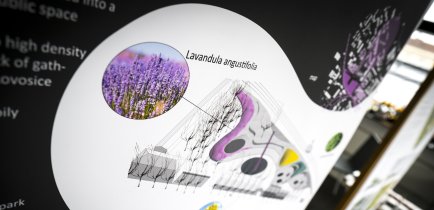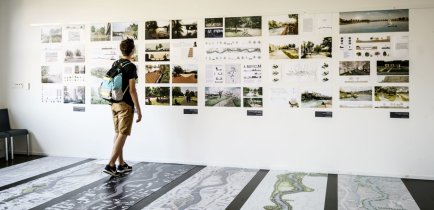You will gain an essential overview of the history of art and architecture and will learn the foundations of the specialized natural science disciplines required for this field, such as dendrology. Eventually, you will be able to process a landscape design study, such as for a park, street space or sports ground, including all the particulars and detailed elaboration, including, for example, a cultivation plan.
The newest study program at the Faculty of Architecture shatters the naïve idea that landscape architecture is something that is added to architecture after all the other professions have completed their jobs. Up to now, the education available education in this field in the Czech Republic mainly focused on the cultivation of knowledge in gardening and the natural sciences. But at our faculty, teaching links the knowledge and skills that are characteristic of the landscape architect with many aspects of the education of the architect and urban planner.
WHAT WILL YOU LEARN?

HARD CRAFT AND BEAUTIFUL ART
In keeping with Vitruvius’s statement that the construction of any kind of structure must have three fundamental properties – firmitas, utilitas, venustas; that is, structural stability, utility and beauty, so too will your studies at the faculty, though most likely challenging and hard, aim to achieve a similar result without wasting time. This means you will not only master technical skills – but you will also have plenty of space for creativity and your muse, along with many opportunities to allow your talent to take flight.

THINK LIKE A LANDSCAPE ARCHITECT
The essence is to learn to see the world around you through the eyes of not only a landscape designer, but at the same time also as an architect. A landscape architect is not, as most people think, the same as a gardener, but must know how to perceive surrounding natural and created elements as a whole, and be able to thoroughly analyse it and impart a new quality to it.

FIELD WITH potential
Landscape architecture is a discipline that is undergoing tremendous growth throughout the world, not only in developed countries, but even in Third World countries. The landscape architect is a mediator between the planning processes and the public, and an advocate for sustainability of a good quality environment for future generations. It is a field that works with the landscape, space and has a broad scope. A landscape architect finds employment in nature, in the countryside, in cities and in industrial areas.
WHY STUDY WITH US?
-
Vertical Studios
The studio is a subject in which you apply your arsenal of theoretical knowledge. Gradually, you try designing municipal spaces, landscapes, objects, etc. There are over forty studios, headed by recognized leaders in the field – and the attribute “vertical” means that in the context of the studio, students can collaborate on a single project regardless of whether they are in their second, third, fourth or final year.
-
Individual Approach
Emphasis on studio teaching allows a very close collaboration between the students and teachers. They meet twice a week in the chosen studio and the adept can spend a good amount of time on each assignment with his or her “guru”, discussing the elected approach and the most appropriate solution.
-
Learning by Doing
Students of the Faculty of Architecture do not spend hours upon hours in lecture halls. To get a good feel for reality, in line with the “learning by doing” concept, we use workshops, excursions and various forms of DIY and creating. That is, we do things that cannot be simply memorized through repetition.
TEACHERS
The teachers at the Faculty of Architecture are not solely academics, but, above all, they are also engaged in professional practice – recognized experts in their respective fields. And they are wonderfully distinctive personalities, so don’t expect any boring, stuffed shirts. Instead, you can look forward to them taking you on an excursion to an environment not many ever get to see, or maybe even out for a beer.
GRADUATES
Landscape architect is a broadly-educated expert, whose main activity is the designing of public spaces and cultural landscapes. The landscape architect is prepared for multi-disciplinary participation in planning processes, such as preparing urban, regulatory and land-use plans. Fundamental knowledge of architecture and urban planning allow the landscape architect to play an important role in the detailed planning of settlement exteriors on small and large scales. The landscape architect can work at a landscape design studio, freelance or for the government.
ENTRANCE EXAMS
Candidates that have completed their bachelor’s studies in the same or a related field may apply to the master’s degree programme. In contrast to the entrance exams for the Bachelor’s programme, however, there are no talent tests, but rather the student’s portfolio of school work or other projects the candidate has worked on are evaluated. Graduates in Bachelor’s studies in a related programme at the FA at CTU with excellent results are accepted to the Master’s programme without entrance exams.
STATE FINAL EXAMS
The state final exams consist of a state final exam on the subject blocks and a defence of the thesis. The state exams precede the thesis defence and the successful completion of the required subjects is a prerequisite.
diploma project
The diploma project verifies the student's ability to independently master a landscape design project in its entirety. The student must apply theoretical and technical knowledge and the ability to analyse a complex problem and design a solution. The work is independent, proceeding from the research of implemented projects, analysis of the area under design consideration, through to the establishment of a program and the spatial design concept, to the design of structures, materials and the final graphic presentation. It is preceded by a thesis seminar, a set of research and background materials on which the student then basis his or her final thesis. The evaluation of the thesis is a part of the state final exam and takes place in the form of a defence of the work before the commission.













